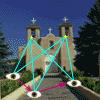![]()
![]()
Recent Publications
Current research work is concentrated on a parallel processing system based on streams, MagicEight. My doctoral thesis is that streams are a mechanism for enabling efficient dynamic parallelization of the computational tasks typically found in media processing.
My thesis proposal has been approved, I'm working to make it a reality...
An early paper presenting a system based on this mechanism is John A. Watlington and V. Michael Bove, Jr., "A System for Parallel Media Processing ", Proceedings of the Workshop on Parallel Processing in Multimedia, held in conjuction with IPPS '97, April 1, 1997.
This paper is a quick intro to the stream mechanism which is
both a part of my future work and is also integral to Cheops.
John A. Watlington and
V. Michael Bove,
Jr., "Stream-Based Computing and Future
Television", Proceedings of the 137th SMPTE Technical
Conference, September 1995.
![]()
Cheops
This paper describes the Cheops System, after five years of
development and extensions !
V. Michael Bove,
Jr. and John A. Watlington, "Cheops: A Reconfigurable
Data-Flow System for Video Processing", IEEE Trans. on
Circuits and Systems for Video Technology, Vol. 5, No. 2, April 1995.
One of the applications areas for Cheops has been Holovideo.
This paper describes a stream processor we developed to accelerate
computational holography.
John A. Watlington,
Mark Lucente,
Carlton J.
Sparrell, V.
Michael Bove, Jr., and Ichiro Tamitani, "A Hardware
Architecture for Rapid Generation of Electro-Holographic Fringe
Patterns", Proceedings of SPIE #2406-23 Practical
Holography IX, SPIE, Bellingham, WA, Feb. 1995.
![]()
In 1997 I surveyed the state-of-the-art of commercially video and graphics processors. The article and accompaying links are available for browsing.
I heartily recommend Walter Bender's MAS815: Introduction to Color, even for people who've already worked with color theory ! My own Color Notes explore some experiments in color constancy, among other things.
In spring '96, I took a graduate seminar (MAS961) here are the Media Lab entitled "On Being Meta". We studied and explored the ways and means of adapting information presentation and manipulation for different contexts. I explored tools for building online community, as well as put our structured video tools to a good test in my final project, Metafinger. Unfortunately it isn't running right now...
 I also recommend
The Nature of
Mathematical Modeling, a class which refreshed my math and taught
me new modeling techniques. My final
project was an attempt at tracking camera motion over time using
its video output.
I also recommend
The Nature of
Mathematical Modeling, a class which refreshed my math and taught
me new modeling techniques. My final
project was an attempt at tracking camera motion over time using
its video output.
In fall '96 I TA'd one of the core courses for Media Lab and Cognitive Science students: "Signals, Systems, and Information for Media Technology".